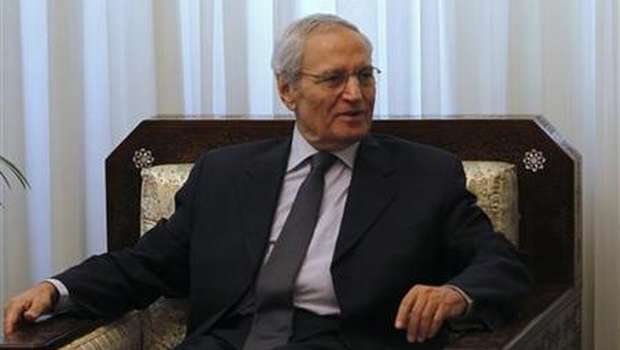
Syria’s Vice President Farouk Al-Shara sits in his office during a meeting with an Iranian delegation (not in picture) in Damascus on August 26, 2012.
(Reuters/Khaled al-Hariri)
Beirut, Asharq Al-Awsat—Leader of the Syrian National Coalition, Ahmad Al-Jarba, has called for Syrian Vice President Farouk Al-Shara to lead the Syrian government’s delegation in future peace talks, because “the current government delegation has no credibility.”
Jarba accused the government of President Bashar Al-Assad of lying on Saturday, following an announcement by the government’s delegation of its intention to participate in the second round of talks set to begin on Monday, after previously saying it needed time to consider returning to the international negotiations in Geneva.
“There was no need for their lies; we need someone like Shara,” Jarba said. “Where is the vice president? Let him lead this delegation because he has credibility with us.”
He described the members of the delegation which participated in the first round of negotiations as having no credibility with the opposition.
Syrian Foreign Minister Walid Al-Mouallem led the government delegation in the first round of talks which centered on the terms set out in a previous international summit on the Syrian conflict in 2012, known as “Geneva I.”
The 2012 talks produced a call for the creation of an interim, transitional government in Syria composed of figures acceptable to both sides. The Syrian opposition maintains that this rules out a future role for President Assad and his close associates, while the Syrian government says it wants this to be decided by elections, despite the war currently raging in the country.
Coalition member Hisham Marwah told Asharq Al-Awsat that Jarba’s call for Shara to head the government delegation “stems from the fact that his hands were not stained with blood,” and follow similar calls by former Coalition leader Moaz Al-Khatib for Shara to be placed in charge of the Syrian government’s representatives at the talks.
Marwah denied that there was any communication between the Coalition and Shara, and added that the vice president had “constitutional powers to make decisions in the absence of the president and therefore, has greater ability than the government’s delegation to make decisions and facilitate negotiations, in addition to the fact he is a veteran diplomat.”
Marwah said the Syrian government’s rejection of the calls for Shara to lead the delegation would not lead to a boycott of future negotiations.
Shara is the only serving Syrian official to date to have admitted his differences with President Assad about the crisis publically, and he called for a “historic resolution” to end it. He offered from the outset to act as an intermediary due to his links to his hometown Daraa and his loyalties to the regime.
Jarba made the calls following a meeting with Egyptian Foreign Minister Nabil Fahmi on Saturday during which they discussed the Syrian crisis.
Fahmi said he understood that the peace process in Geneva, despite the difficulties, was the only means to find a new drive for a political solution which satisfied the Syrian people’s aspirations for change, freedom and democracy.
Jarba explained the results of his recent international visits and expressed his desire to coordinate with Egypt as one of the first countries to support the Syrian revolution, adding that the Coalition aimed at creating a modern state in Syria.
Marwah said the opposition delegation in Geneva was “considering the suspension of participation [in the negotiations] until the regime stops the bombings and arrests.”
Meanwhile, the meeting in Cairo between Jarba and leader of the Syrian opposition’s National Coordination Committee (NCC), Hassan Abdul Azim, failed to achieve any progress on expanding the opposition’s delegation to the second round of talks starting on Monday.
Secretary of the NCC in diaspora, Majid Habbo, told Asharq Al-Awsat that Jarba and Abdul Azim agreed on a number of points, but disagreed on some.
He said: “The main differences were about the composition of the delegation and the political plan, as well as the prior conditions placed by the Coalition on some of the names suggested to participate in the talks, especially deputy coordinator-general of the NCC, Saleh Musallam.”
Habbo added: “It is clear that the differences between the two sides are wide for personal and objective reasons . . . any agreement between the two sides must be ratified by the executive bureau of the NCC.”
Habbo further said the NCC “believes the next stage of the negotiations should be postponed, in order to conclude the discussion between all parts of the opposition.”
